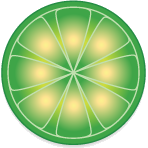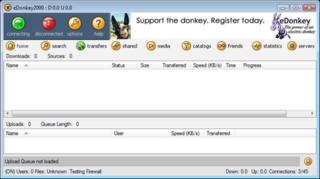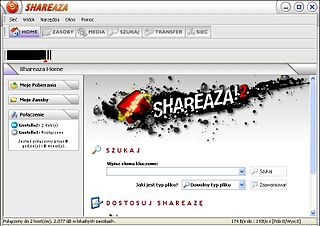
BearShare was a peer-to-peer-file-sharing-application originally created by Free Peers, Inc. for Microsoft Windows and also a rebranded version of iMesh by MusicLab, LLC, tightly integrated with their music subscription service.
Gnutella is a peer-to-peer network protocol. Founded in 2000, it was the first decentralized peer-to-peer network of its kind, leading to other, later networks adopting the model.
Kazaa Media Desktop. was a peer-to-peer file sharing application using the FastTrack protocol licensed by Joltid Ltd. and operated as Kazaa by Sharman Networks. Kazaa was subsequently under license as a legal music subscription service by Atrinsic, Inc., which lasted until August 2012.

LimeWire was a free peer-to-peer file sharing client for Windows, macOS, Linux, and Solaris. Created by Mark Gorton in 2000, it was most prominently a tool used for the download and distribution of pirated materials, particularly pirated music. In 2007, LimeWire was estimated to be installed on over one-third of all computers globally.
FastTrack is a peer-to-peer (P2P) protocol that was used by the Kazaa, Grokster, iMesh and Morpheus file sharing programs. FastTrack was the most popular file sharing network in 2003, and used mainly for the exchange of music MP3 files. The network had approximately 2.4 million concurrent users in 2003. It is estimated that the total number of users was greater than that of Napster at its peak.

Shareaza is a peer-to-peer file sharing client running under Microsoft Windows which supports the Gnutella, Gnutella2 (G2), eDonkey, BitTorrent, FTP, HTTP and HTTPS network protocols and handles magnet links, ed2k links, and the now deprecated gnutella and Piolet links. It is available in 30 languages.

eDonkey2000 was a peer-to-peer file sharing application developed by US company MetaMachine, using the Multisource File Transfer Protocol. It supported both the eDonkey2000 network and the Overnet network.
Grokster Ltd. was a privately owned software company based in Nevis, West Indies that created the Grokster peer-to-peer file-sharing client in 2001 that used the FastTrack protocol. Grokster Ltd. was rendered extinct in late 2005 by the United States Supreme Court's decision in MGM Studios, Inc. v. Grokster, Ltd. The court ruled against Grokster's peer-to-peer file sharing program for computers running the Microsoft Windows operating system, effectively forcing the company to cease operations.

gtk-gnutella is a peer-to-peer file sharing application which runs on the gnutella network. gtk-gnutella uses the GTK+ toolkit for its graphical user interface. Released under the GNU General Public License, gtk-gnutella is free software.

Gnutella2, often referred to as G2, is a peer-to-peer protocol developed mainly by Michael Stokes and released in 2002.
PDFCreator is an application for converting documents into Portable Document Format (PDF) format on Microsoft Windows operating systems. It works by creating a virtual printer that prints to PDF files, and thereby allows practically any application to create PDF files by choosing to print from within the application and then printing to the PDFCreator printer.
GnucDNA was a software library for building peer-to-peer applications. It provides developers with a common layer to create their own Gnutella or Gnutella2 client or network. As a separate component, GnucDNA can be updated independently of the client, passing down improvements to the applications already using it.
This is a timeline of events in the history of networked file sharing.

FrostWire is a free and open-source BitTorrent client first released in September 2004, as a fork of LimeWire. It was initially very similar to LimeWire in appearance and functionality, but over time developers added more features, including support for the BitTorrent protocol. In version 5, support for the Gnutella network was dropped entirely, and FrostWire became a BitTorrent-only client.
File sharing is a method of distributing electronically stored information such as computer programs and digital media. This article contains a list and comparison of file sharing applications; most of them make use of peer-to-peer file sharing technologies.

Zango,, formerly ePIPO, 180solutions and Hotbar, was a software company that provided users access to its partners' videos, games, tools and utilities in exchange for viewing targeted advertising placed on their computers. Zango software is listed as adware by Symantec, and is also labeled as a potentially unwanted program by McAfee. Zango was co-founded by two brothers: Keith Smith, who served as the CEO; and Ken Smith, who served as the CTO.

Messenger Plus! is an add-on for Windows Live Messenger and Skype. The software provides additional functionality to Microsoft's Instant messaging client, Windows Live Messenger, by adding its own controls to the main interface. These controls affect Messenger's behaviour and appearance, often through additional dialog boxes.

μTorrent, or uTorrent, is a proprietary adware BitTorrent client owned and developed by Rainberry, Inc. The "μ" in its name comes from the SI prefix "micro-", referring to the program's small memory footprint: the program was designed to use minimal computer resources while offering functionality comparable to larger BitTorrent clients such as Vuze or BitComet. μTorrent became controversial in 2015 when many users unknowingly accepted a default option during installation which also installed a cryptocurrency miner.
A potentially unwanted program (PUP) or potentially unwanted application (PUA) is software that a user may perceive as unwanted or unnecessary. It is used as a subjective tagging criterion by security and parental control products. Such software may use an implementation that can compromise privacy or weaken the computer's security. Companies often bundle a wanted program download with a wrapper application and may offer to install an unwanted application, and in some cases without providing a clear opt-out method. Antivirus companies define the software bundled as potentially unwanted programs which can include software that displays intrusive advertising (adware), or tracks the user's Internet usage to sell information to advertisers (spyware), injects its own advertising into web pages that a user looks at, or uses premium SMS services to rack up charges for the user. A growing number of open-source software projects have expressed dismay at third-party websites wrapping their downloads with unwanted bundles, without the project's knowledge or consent. Nearly every third-party free download site bundles their downloads with potentially unwanted software. The practice is widely considered unethical because it violates the security interests of users without their informed consent. Some unwanted software bundles install a root certificate on a user's device, which allows hackers to intercept private data such as banking details, without a browser giving security warnings. The United States Department of Homeland Security has advised removing an insecure root certificate, because they make computers vulnerable to serious cyberattacks. Software developers and security experts recommend that people always download the latest version from the official project website, or a trusted package manager or app store.









